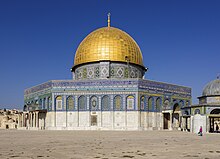User:AmateurHi$torian/sandbox
| Hayat Bakshi Mosque | |
|---|---|
 | |
| Religion | |
| Affiliation | Islam |
| Architecture | |
| Completed | 1666 |

History
[edit]The mosque was completed in 1666.
Location
[edit]Description
[edit]The mosque is rectangular in shape, flanked by two minarets. The facade of the mosque has five entrance arches. A parapet wall rises above the structure.
Interior
[edit]- ^ "Conservation work on grand mosque nearing completion". The Hindu. 2020-08-31. ISSN 0971-751X. Retrieved 2023-07-23.
- ^ Bilgrami, Syed Ali Asgar (1927). Landmarks Of The Deccan. pp. 166–168.
Chief Justice of Hyderabad High Court, Hyderabad State
[edit]| Name | Image | Term Start | Term end | |
|---|---|---|---|---|
| Nawab Imad Jung Bahadur | 
|
|||
| Khuda Bakhsh | 
|
1895 | 1898 | |
| Mahomed Hameed Ullah Khan | 
|
1908 | [1] | |
| Nizamat Jung | 1916 | 1918 | ||
| Mirza Yar Jung | 4th September 1918 | 4th April 1937 | [2] | |
| Jivan Yar Jung | 4th April 1937 | |||
| Alam Yar Jung | 
|
1943 |
- ^ Rao, C. Hayavadana, "Hameed Ullah Khan, M. Sarbuland Jang", The Indian Biographical Dictionary (1915), retrieved 2023-07-24
- ^ Hyderabad State. (1937). List Of Leading Officials Nobles And Personages. Osmania University, Digital Library Of India. Hyderabad Residency Government Press.
Moulvi Haji Md. Fazlullali Sahib . .
2. Moulvi Ahmad Ali Khan Sahib
3. Moulvi Md. Karimuddin Sahib
4. Nawab Kasim Yar Jung Bahadur . . c. Haji Fida Husain Khan Sahib
6. Haji Hafiz Abdul Karim Khan Sahib
7. Nawab Fateh Nawaz Jung Bahadur
8. Nawab Inmad Jung Bahadur
9. Moulvi Mir Afzal Ilusain Sahib
30. Moulvi Khuda Baksh Khun Sahib . .
13. Moulvi Mir Afzal Husain Salnb
12. Nawab Sarbuland Jung Bahadur . .
13. Nawab Hakimuddowla Bahadur
14. Moulve Mohiuddin Klian Sahib
15. Nawab Sir Nizamath Jung Bahadur
16. Nawab Jabbar Yar Jung Bahadur ..
17. Nawab Mirza Yar Jung Bahadur . .
18. Nawab Jivan Yar Jung Bahadur
Temple
[edit]is a temple in Alwal, Hyderabad.
| AmateurHi$torian/sandbox | |
|---|---|
| Religion | |
| Affiliation | Hinduism |
| Deity | Venkateswara |
History
[edit]The temple was commissioned by Chandu Lal, who was the Prime Minister of Hyderabad.[1]
Architecture
[edit]References
[edit]Career
[edit]Muhammad Shah II (Bahmani sultan)
[edit]| AmateurHi$torian/sandbox | |
|---|---|
 |
Accession
[edit]Reign
[edit]- ^ Siddiqi, A. M. (1941). "Mohammad Shah Ii Bahmani, the Pioneer of the Medieval Culture of the Deccan". Proceedings of the Indian History Congress. 5: 582–586. ISSN 2249-1937.
Hakim-ud-Daula
[edit]Octagonal tombs in India
[edit]The Octagonal type, also known as the Lodi type, is a type of mausoleum which was built by various dynasties in Northern India between the 14th and 15th centuries.
The style developed with the tomb of Khan-i Jahan Tilangani built during the Tughlaq period,
Development
[edit]
Tomb of Khan-i Jahan Tilangani
[edit]The tomb of Khan-i Jahan Tilangani, built in the 14th century, was the first octagonal tomb in India. Percy Brown states that while it might have been a purely Indian invention, it is also possible that its octagonal design was inspired by the Dome of the Rock in Jerusalem.
The burial chamber had an octagonal verandah running around it, with three arched entrances on each side. A chajja was projected over the arches, and a parapet wall ran along the roof. Eight cupolas rose above each side, while the building was surmounted with a main dome.
Sayyid and Lodi period
[edit]Suri period
[edit]Mughal period
[edit]The tomb of Adham Khan in Delhi
List
[edit]| Name | Image | Period | Location | Ref |
|---|---|---|---|---|
| Tomb of Khan-i Jahan Tilangani | Domes of TIlangani's tomb (16059169051).jpg | Tughlaq | ||
| Tomb of Mubarak Shah | File:Mubarak Shah's tomb.jpg | Sayyid | ||
| The tomb of Mohammed Shah | 
|
Sayyid | ||
| Tomb of Sikandar Lodi | 
|
Lodi | ||
| Tomb of Hasan Khan Suri |
|
Sur | ||
| Tomb of Bakhtiyar Khan |
|
Sur | ||
| Tomb of Sher Shah Suri | Sher Shah Suri Tomb.jpg | Sur | ||
| Tomb of Isa Khan | 
|
Sur | ||
| Tomb of Adham Khan | 
|
Mughal |
Saraswati enthroned/Saraswati plays on a vina
[edit]Background
[edit]Description
[edit]Analysis
[edit]- ^ Overton, Keelan (2016). "Book Culture, Royal Libraries, and Persianate Painting in Bijapur, Circa 1580‒1630". Muqarnas. 33: 91–154. ISSN 0732-2992.
- ^ Goswamy, B. N. (2014-12-01). The Spirit of Indian Painting: Close Encounters with 100 Great Works 1100-1900. Penguin UK. ISBN 978-93-5118-862-9.
- ^ Haidar, Navina Najat; Sardar, Marika (2011). Sultans of the South: Arts of India's Deccan Courts, 1323-1687. Metropolitan Museum of Art. ISBN 978-1-58839-438-5.
History of the Osmania University
[edit]Post-Independence (1948-present)
[edit]- ^ Vaddanam, Srinivas Rao (2016). "Osmania University — a Landmark in Vernacular Education and Student's Movements in Hyderabad State". Proceedings of the Indian History Congress. 77: 358–369. ISSN 2249-1937.
- ^ Datla, Kavita (2009). "A Worldly Vernacular: Urdu at Osmania University". Modern Asian Studies. 43 (5): 1117–1148. ISSN 0026-749X.
Dakhni
[edit]- ^ Sinha, Vandana (2019-06-12). "Documentation of Indo-Islamic architecture built along a 16th-century highway". Art Libraries Journal. 44 (3): 98–107. doi:10.1017/alj.2019.14. ISSN 0307-4722.

